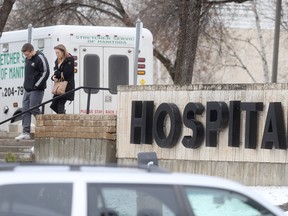Health
Manitobans Face Long Waits for Health Care, Choose Surgery Abroad

In Manitoba, long wait times for medical care have led some residents to make difficult choices, including traveling abroad for treatment. Dean Simpson, who recently endured a painful back injury, faced a staggering wait for surgery in Canada. Frustrated by the lengthy delay, he and his wife opted to fly to Mexico, paying out-of-pocket for the necessary procedure.
This scenario is not unique. Many families in Manitoba have considered or pursued similar options to circumvent the extensive wait times that plague the province’s healthcare system. According to the latest data, the median wait time from a referral by a family doctor to receiving treatment from a specialist in Manitoba reached an alarming 37.9 weeks last year. This marks a significant increase from the 10.5-week average in 1993, when national estimates of wait times first began.
Economic and Personal Impact of Delayed Care
The implications of these extended wait times extend beyond mere inconvenience. Patients often experience prolonged pain, psychological distress, and potentially worse health outcomes as a result of delays in receiving care. Furthermore, the economic impact is substantial. Recent estimates suggest that the average wait of 16.5 weeks for care after seeing a specialist in Manitoba has cost patients approximately $171 million in lost wages.
For many Canadians, including those like the Simpsons, options for more immediate care are limited. The Canadian healthcare system places strict restrictions on private healthcare payments, making it challenging for patients to choose alternative methods of obtaining timely treatment. One of the few available solutions is to seek care abroad, which can be prohibitively expensive.
Comparing Healthcare Systems: Canada, Switzerland, and Australia
Despite being lauded for its universal healthcare system, Canada faces significant challenges when it comes to wait times. In contrast, countries such as Switzerland and Australia, which also have universal health care, report much shorter waiting periods for non-emergency procedures. In 2023, over 58.3% of Canadians indicated they waited more than two months for non-emergency surgery. This figure starkly contrasts with 21.1% of Swiss residents and 33.1% of Australians facing similar delays.
Interestingly, Australia allocates slightly less of its GDP to healthcare—10.6%—compared to Canada’s 11.5%. Switzerland’s spending is marginally higher at 11.9%. A key difference lies in how these countries utilize the private sector in their healthcare systems. In Switzerland, the majority of hospitals are private, accounting for half of all hospitalizations in 2023. Patients can choose between public and private hospitals for their treatment.
Similarly, Australia’s private hospitals handle much of the non-emergency care, providing an alternative for patients seeking quicker access to treatment. In contrast, Canada’s framework for universal health care limits private options, which subsequently restricts patient choice and access to timely care.
These disparities highlight the challenges faced by Canadian patients, as they navigate a system that, while designed to provide universal coverage, often fails to deliver prompt care. The experiences of Manitobans like Dean Simpson underscore the urgent need for reform to improve healthcare accessibility and reduce wait times for all Canadians.
As residents voice their concerns over the current state of healthcare in Manitoba and beyond, the conversation surrounding potential solutions continues. The need for a more effective and responsive healthcare system remains a priority for many.
-

 World3 months ago
World3 months agoScientists Unearth Ancient Antarctic Ice to Unlock Climate Secrets
-

 Entertainment3 months ago
Entertainment3 months agoTrump and McCormick to Announce $70 Billion Energy Investments
-

 Lifestyle3 months ago
Lifestyle3 months agoTransLink Launches Food Truck Program to Boost Revenue in Vancouver
-

 Science3 months ago
Science3 months agoFour Astronauts Return to Earth After International Space Station Mission
-

 Technology2 months ago
Technology2 months agoApple Notes Enhances Functionality with Markdown Support in macOS 26
-

 Top Stories1 week ago
Top Stories1 week agoUrgent Update: Fatal Crash on Highway 99 Claims Life of Pitt Meadows Man
-

 Sports3 months ago
Sports3 months agoSearch Underway for Missing Hunter Amid Hokkaido Bear Emergency
-

 Politics2 months ago
Politics2 months agoUkrainian Tennis Star Elina Svitolina Faces Death Threats Online
-

 Technology3 months ago
Technology3 months agoFrosthaven Launches Early Access on July 31, 2025
-

 Politics3 months ago
Politics3 months agoCarney Engages First Nations Leaders at Development Law Summit
-

 Entertainment3 months ago
Entertainment3 months agoCalgary Theatre Troupe Revives Magic at Winnipeg Fringe Festival
-

 Politics1 week ago
Politics1 week agoShutdown Reflects Democratic Struggles Amid Economic Concerns



















